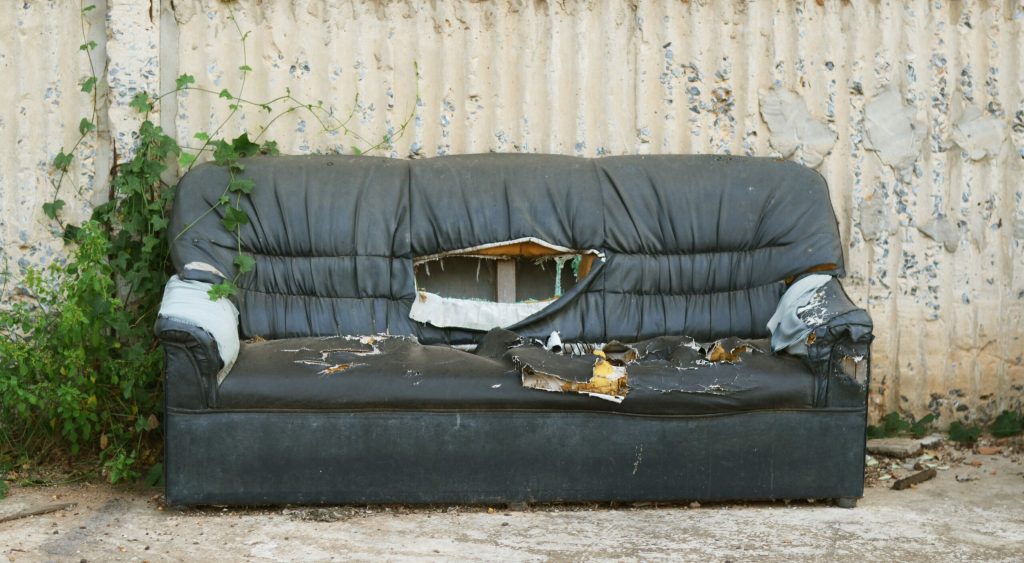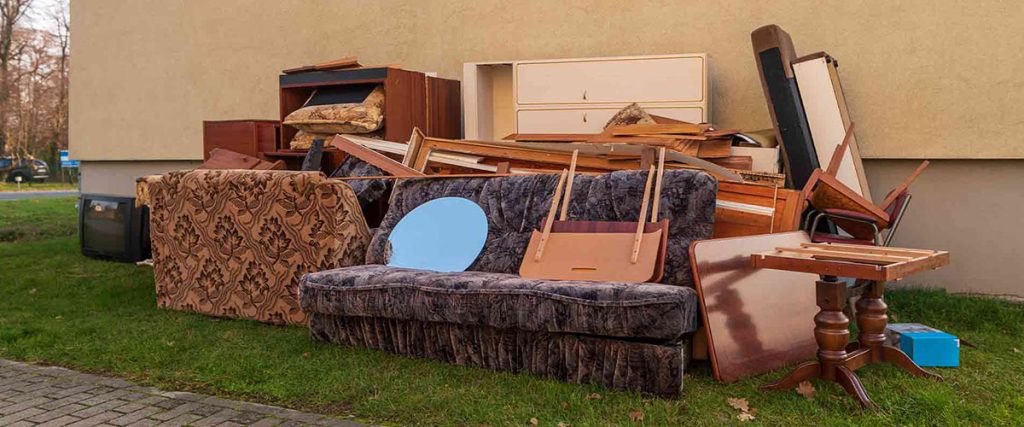If you are thinking about disposing of your upholstered sofa at the corner of the street or alongside the disposal bin, stop right away.
Why? Because of the threat of POPs in the upholstered furniture.
From January 1, 2023, new regulations are in place to manage the refused upholstered sofas, chairs, and other items due to the presence of POPs. The Environmental Protection Agency’s law mandates local authorities to follow specific procedures for disposal.
This means that local landfills, recycling plants, and tips can no longer accept upholstered furniture. Adhering to these regulations is not just a legal requirement, but a responsible and proactive step towards protecting our environment and health.
What are POPs?

POPs, or Persistent Organic Pollutants, are chemicals that are hard to break down and linger in the environment for a long time. They are a threat to human health, as even low levels of exposure for a long time can increase the risk of cancer, adversely affect reproductive health, and alter the immune system. Exposure to these pollutants is also a significant concern for food safety.
A common fire-retardant chemical, decabromodiphenyl ether (decaBDE), is a POP. Before 2019, it was applied to upholstered furniture to meet fire safety guidelines. It was banned and phased out in 2019 in the United Kingdom. However, sofas older than 2019 still contain this harmful chemical.
The threat of exposure to POPs significantly increased during the furniture’s disposal phase. This underscores the need for caution and awareness when dealing with such items, making it crucial to adhere to guidelines and follow procedures.
How Local Councils Destroy Upholstered Sofas?
Recycling or crushing upholstered sofas carries the risk of releasing POP toxicants into the environment. According to EWC Code 20 03 07, the only safe way to destroy upholstered sofas containing POPs is to incinerate them.
This process, when done in accordance with energy recovery guidelines, is a safe and effective method of disposal that minimizes the release of pollutants into the air. Therefore, safe disposal not only protects the environment but also adds to energy production.
Considering the stringent laws, it is better to look for all available options to discard your sofa before moving it to the waste stream. For example, if your furniture is still in good condition, you may donate it to a charity or foundation that accepts such items. Remember, the risk of POPs is minimal when the sofa is intact.
Can I take my sofa to Household Waste Recycling Plants?

Some of the local household waste recycling plants cannot accept items that are likely to have POPs after new regulations in 2019. You will have to check the laws with your local councils.
How to Safely Dispose of Upholstered Sofa Containing POPs?
Classify the Items: The new laws about POPs do not apply to items like wooden sofas but are specifically relevant to upholstered furniture. If your sofa is more than five years old, it is highly likely that it contains POPs. So, you should segregate the sofa you need to remove from other non-POP-containing stuff.
Check for POPs: As concerns about POPs begin to arise from 2006, many furniture manufactures mention their presence on labels. It is better to check label for any POP warning or presence of toxic fire retardants.
Keep Refused Sofas Intact: The most interesting thing about POPs is that the risk of exposure is the highest in disposal phase. It means if you try to break down or tamper with the sofa in any way, there is greater risk of POP exposure. Always try to keep the sofas and upholstered chairs in one piece. Even when you hate the sight of your old sofa, beat the urge to destroy it yourself.
Do not Mix with Other Trash: If you mix any parts of your upholstered sofas with other trash, you will have a bigger problem to handle. As per regulations, mixing POP containing materials with other trash result in contamination of the whole waste. It means all the things should be disposed off according to EWC Code 20 03 07. Thus, always keep the refused sofa away from other waste.
Identify the Items: It is best if you paste a note about POP presence on your refused sofa so that the council can process it accordingly. Clear identification can save you and others from a lot of hassle.
Do not Put in Curbside Refusal Bin: Law forbids residents from putting away their upholstered seatings in the refusal bin or alongside it. It poses a risk of contamination, and you may need to pay additional fees for safe disposal of all contents of the bin.
Arrange for an authentic waste disposal service: If the waste contains POPs, your skip company may be unable to help you. As these items cannot be emptied in a tip, there is a high risk of fly-tipping such household waste. You must hire an authentic man with a van service licensed by authorities to transport upholstered sofas to incineration plants. A reliable company will be your best friend in getting rid of all your old, upholstered furniture. From collection and transportation to storing and disposal, a proper waste management company adheres to local community guidelines and stays current on regulation changes.
POPs are toxic and harmful materials, and their proper management is our social and environmental responsibility. Especially after new regulations, adequate disposal of upholstered sofas and other furniture has become an expert job, and you should let experts handle it.











